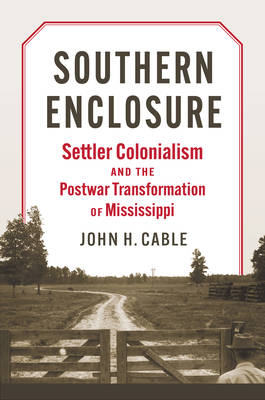
- Retrait gratuit dans votre magasin Club
- 7.000.000 titres dans notre catalogue
- Payer en toute sécurité
- Toujours un magasin près de chez vous
- Retrait gratuit dans votre magasin Club
- 7.000.0000 titres dans notre catalogue
- Payer en toute sécurité
- Toujours un magasin près de chez vous
Southern Enclosure
Settler Colonialism and the Postwar Transformation of Mississippi
John H CableDescription
Historians of the American South have come to consider the mechanization and consolidation of cotton farming--the "Southern enclosure movement"--to be a watershed event in the region's history. In the decades after World War II, this transition pushed innumerable sharecroppers, tenant farmers, and smallholders off the land, redistributing territory and resources upward to a handful of large, mainly white operators. By disproportionately displacing Black farmers, enclosure also slowed the progress of the civil rights movement and limited its impact.
John H. Cable's Southern Enclosure is among the first studies to explore that process through the interpretive lens of settler colonialism. Focusing on east-central Mississippi, home of the Mississippi Band of Choctaw Indians, Cable situates enclosure in the long history of dispossession that began with Indian Removal. The book follows elite white landowners and Black and Choctaw farmers from World War II to 1960--the period when the old, labor-intensive farm structure collapsed. By acknowledging that this process occurred on taken land, Cable demonstrates that the records of agricultural agents, segregationist politicians, and the Bureau of Indian Affairs (BIA) are traces of ongoing colonization.
The settler colonial framework, rarely associated with the postwar South, sheds important light on the shifting categories of race and class. It also prompts comparisons with other settler societies (states in southern and eastern Africa, for instance) whose timelines, racial regimes, and agrarian transitions were similar to those of the South. This postwar history of the South suggests ways in which the BIA's termination policy dovetailed with Southern segregationism and, at the same time, points to some of the shortcomings of the burgeoning field of settler colonial studies.
Spécifications
Parties prenantes
- Auteur(s) :
- Editeur:
Contenu
- Nombre de pages :
- 216
- Langue:
- Anglais
Caractéristiques
- EAN:
- 9780700635832
- Date de parution :
- 15-12-23
- Format:
- Livre relié
- Format numérique:
- Genaaid
- Dimensions :
- 160 mm x 234 mm
- Poids :
- 544 g

Les avis
Nous publions uniquement les avis qui respectent les conditions requises. Consultez nos conditions pour les avis.






